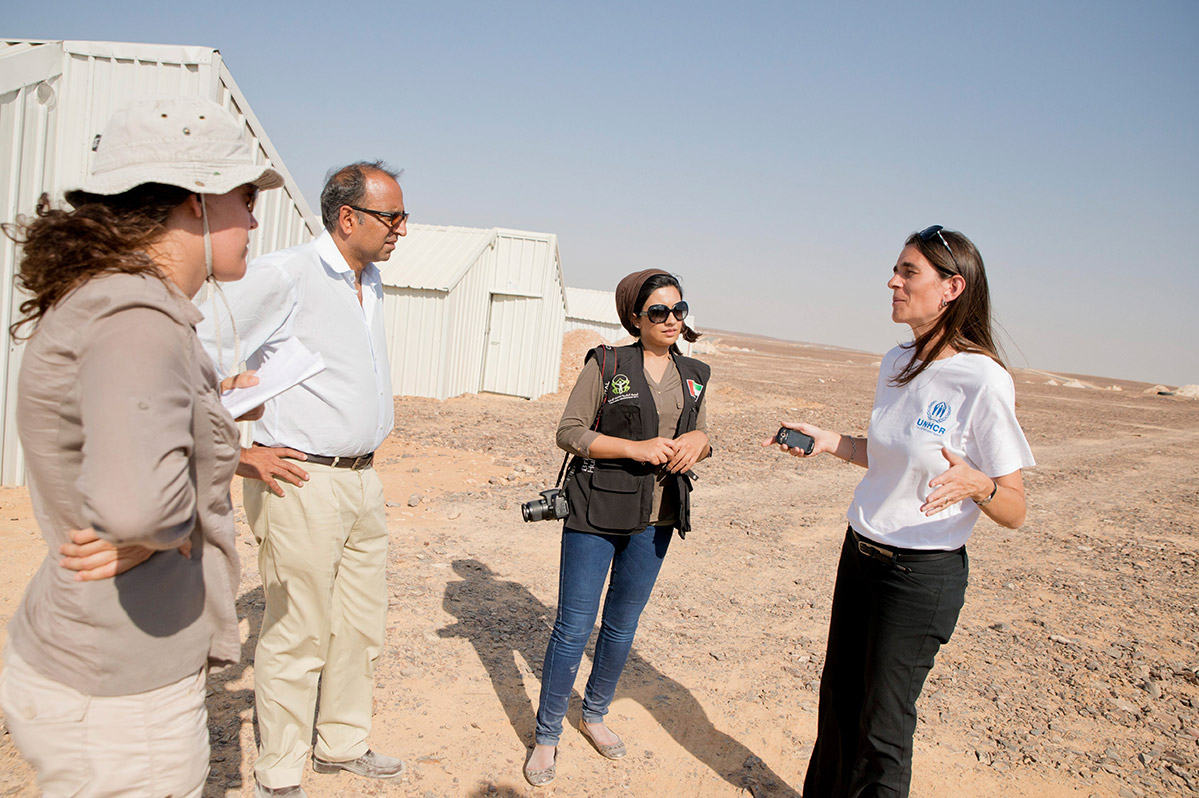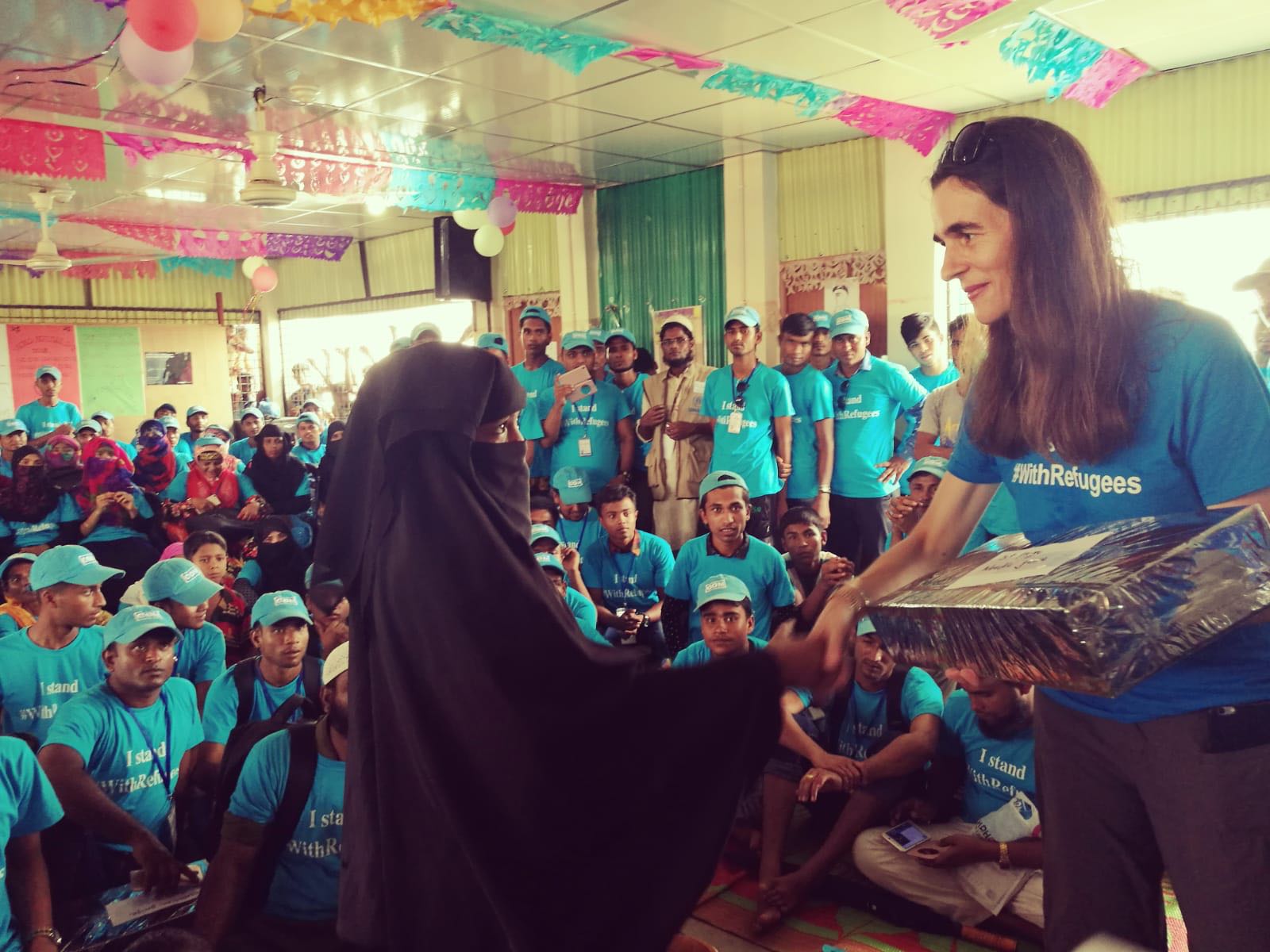
Bernadette Castel-Hollingsworth visited Azraq camp in 2013. (Photo: UNHCR/Jared Kohler)
Looking for female negotiators with outstanding humanitarian careers to further discuss the topic Legitimacy, Diversity and Women in frontline negotiations we spoke with Bernadette Castel-Hollingsworth, Deputy Director of the UN Refugee Agency’s Division of International Protection, who has spent two decades of her professional life negotiating in the field.
Bernadette is passionate about working in the humanitarian sector. As a university student, she already knew she would dedicate her life to improving the lives of refugees and wrote her master’s thesis on the UNHCR. She did an internship at the UNHCR, which led to assignments for the UNHCR’s emergency operations in various countries, such as Pakistan, Liberia, the Central African Republic, Sri Lanka, Tanzania, Uganda, Jordan, Myanmar, Bangladesh, and Burkina Faso. Now she coordinates teams from the UNHCR’s headquarters in Geneva, but she misses the field every day.
Helping People while Staying Safe
Thinking back on her negotiation experiences, there is one counterpart she will never forget: a chef d’état major [chief of the defense staff] of one of the non-state armed groups in the Central African Republic. She was negotiating access to displaced people and addressing violations of international humanitarian law. “It was an intense and dangerous negotiation,” she says.
“I think I was probably the first humanitarian staff member to have a face-to-face meeting with the commander of this group. I still remember him saying to me in French. Madame, we are not here to rape women. We are here for one objective and we haven’t reached that objective yet.”
The objective was to march on Bangui, the capital city. His reply allowed me to be frank and to remind him that he was responsible for the actions of those he commanded and that civilians needed to be protected. This was a case of using the words of your counterpart when negotiating.
She also pointed out that the perception of danger as a humanitarian worker living in a war zone is very different from how family and friends see it from home. She, therefore, emphasized the importance of taking care of loved ones and managing their stress.
“For example, when I was on the frontlines in the Central African Republic and the escalations were reported in the news, my relatives asked me, ‘What are you still doing there?’… When you’re on the phone with them and they hear gunfire, they don’t believe it when you say you’re fine. In the aftermath of one serious event, I recommended that a UNHCR counselor contact my family.”

Bernadette Castel-Hollingsworth visited Azraq camp in 2013. (Photo: UNHCR/Jared Kohler) Bernadette Castel-Hollingsworth attended the 2018 World Refugee Day Ceremony in one of refugee camps in Cox’s Bazaar, Bangladesh. (Photo: Bernadette Castel-Hollingsworth)
Negotiating Is about Your Whole Attitude
Throughout the years, Bernadette said she’s had many role models – men and women of all ages. She stressed that inspiration and learning come not only from above but also from more junior colleagues who can be a valuable source of feedback for any negotiator. Experience helps too, and experience can transfer within a region. But she insists that every negotiation and every counterpart is unique. Her secret weapon as a successful negotiator is preparation.
You have to bring a solid understanding of the situation and palatable and relevant solutions to the table and be aware of what’s at the stake for both sides. But negotiation is much more than thorough preparation. I’ve always felt – and this is something that I learned many years ago – that negotiation is about your whole attitude, your body language, the interaction, everything. From the moment you walk into the room until the end. It’s about the respect you show, the words you use, all the little things. In negotiation, everything is important. You can’t miss any details.
Be Self-Confident and Respectful
Bernadette’s advice for young women starting out in the humanitarian field and being sent to negotiate on the frontlines is to be self-confident, to have self-respect, and to be unselfish – providing a foundation necessary to treating others as equals. In her view, to be able to negotiate successfully, you need to be able to communicate while respecting the other person. Although it’s important to understand your own perspective, you also need to listen, read and study to understand the other side’s perspective. She recalled a brief exchange she had during the interview for her first assignment, in Pakistan, 20 years ago. The interviewer told her that she might have to wear a veil and was asked how she would feel about that. She replied that she looked forward to it.
My interviewer was surprised and asked me why. I replied, ‘So that I will be able to better observe and understand.’ My interviewer countered, ‘So you see yourself more as an observer, not as a doer?’, and I replied, ‘I totally see myself as a doer. But to be able to do well, you need to be able to understand the context.’
Asked about the challenges of working in male-dominated contexts and teams, Bernadette emphasized that in the field, there is no room for ego – what matters is that everyone is prepared and knows which role to play during the negotiation.
“Negotiation is a team effort. The most important thing is the outcome that you achieve together as a team, not whether you are a man or woman.”
